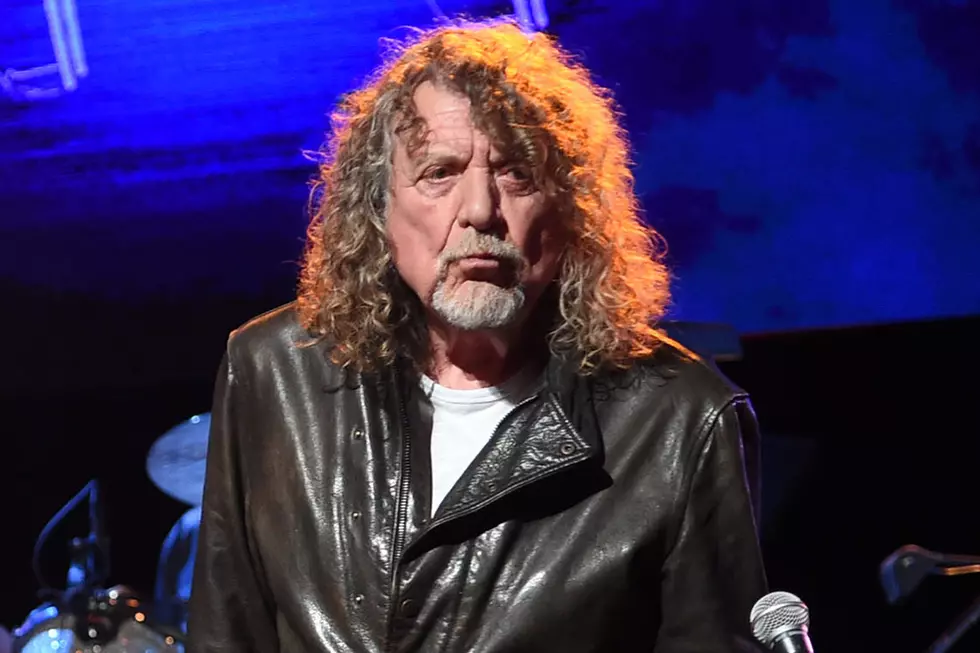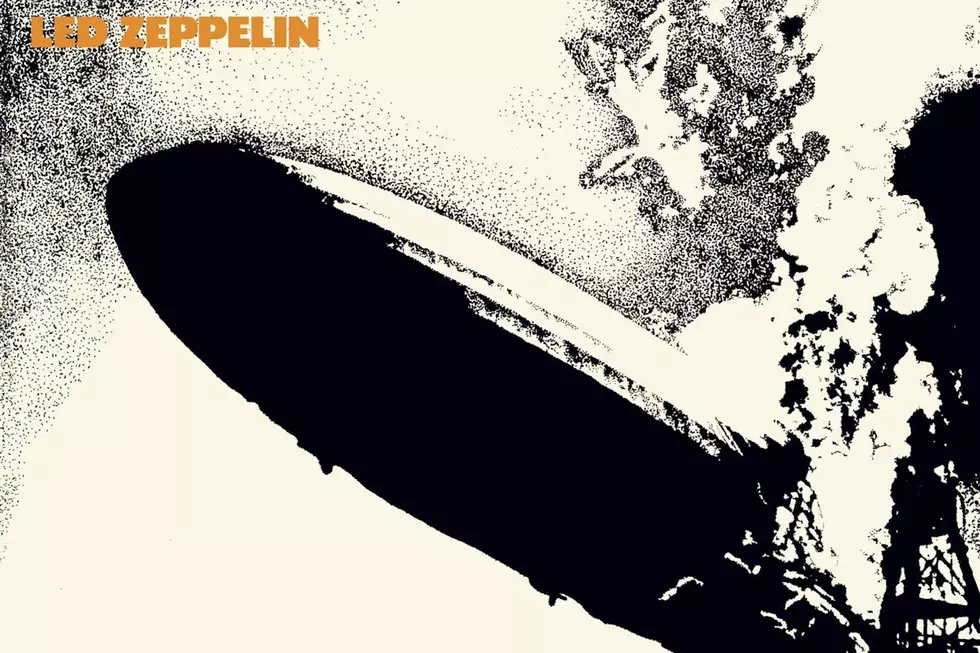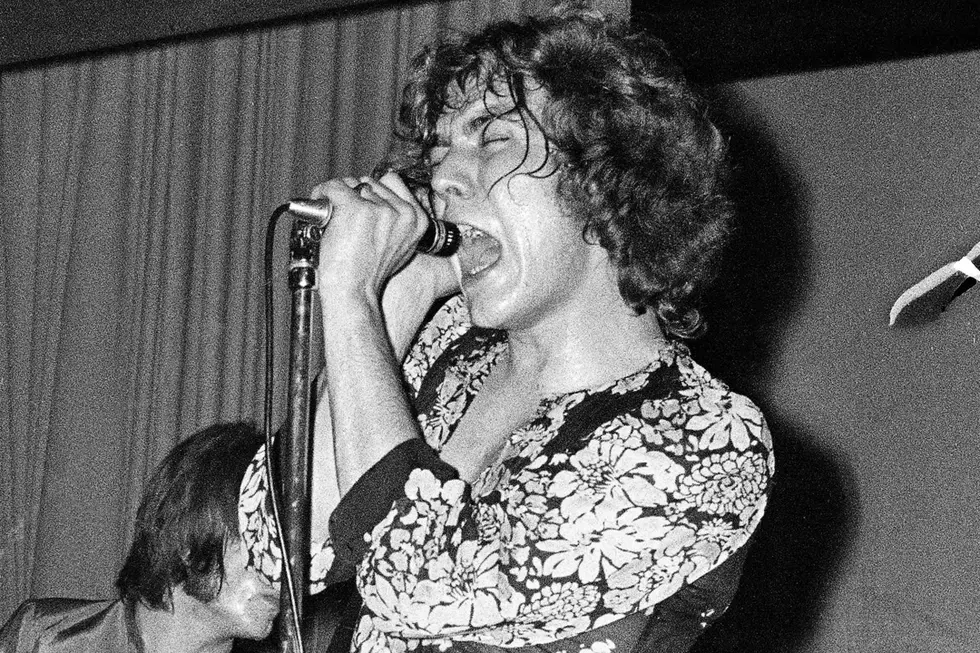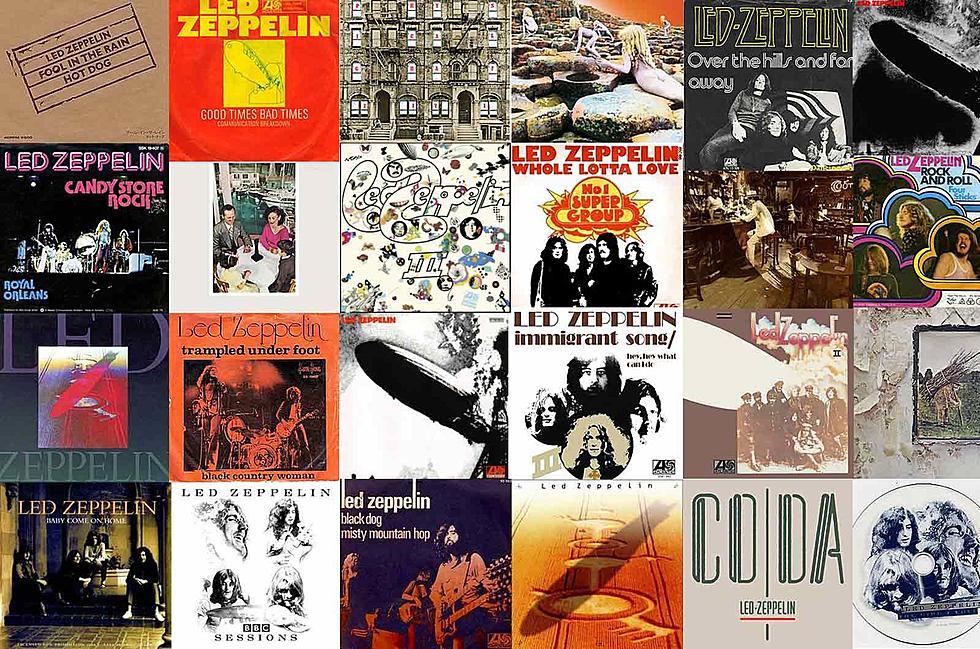10 More Years Gone: Why the 2007 Reunion Was Led Zeppelin’s Last Stand
On Dec. 10, 2007, the surviving members of Led Zeppelin performed a full-length concert together for the first time in more than 27 years.
Three of the four men who shared the stage that night seemed eager for this to be a new beginning. But as time goes on, it seems more and more clear that this was, in fact, Led Zeppelin's last stand.
The show, at the O2 Arena in London, was a tribute to Atlantic Records founder Ahmet Ertegun and headlined by the biggest band he’d helped bring to the world stage. There were less than 20,000 tickets available, but more than 20 million people applied – an official world record.
Led Zeppelin had split immediately following the death of drummer John Bonham in 1980. Prior to the 2007 event, they had appeared together only twice since then, and neither performance was a success. Singer Robert Plant called their first reunion at Live Aid in 1985 an “atrocity”; he said their Atlantic 40th-anniversary show in 1988 was “foul.” They desperately needed this new show to be much bigger and much better.
And it was. Plant, Jimmy Page, John Paul Jones and Bonham’s son Jason delivered an experience so engaging that none of them will ever again sit through an interview without being asked about a reunion.
Yet that reunion was never going to happen, as Plant made clear within minutes of taking his last bow. While everyone else celebrated with an epic backstage party, he left the venue. “I ended up in the Marathon pub in Camden, drank four bottles of Keo lager and half a bottle of vodka, then went to bed,” he later said. “Because I had to get away from it. I’d done it. I had to go. It was too heavy. Beautiful, but talk about examining your own mortality! Crazy.”
Plant was much more interested in his solo career, which had just been reinvigorated with the release of Raising Sand, his album with Alison Krauss that went on to win five Grammy Awards. The exploration of Americana proved to be a major turning point in his career, spurring his eclectic desires to new levels and resulting in a chain of releases that, if not detaching him from his Led Zeppelin past, at least proved there was much more to him.
Listen to Robert Plant and Alison Krauss' 'Killing the Blues'
“I’ve gone so far somewhere else that I almost can't relate to it,” he said of the reunion show. “It's a bit of a pain in the pisser to be honest. Who cares? I know people care, but think about it from my angle – soon, I'm going to need help crossing the street."
His bandmates didn’t feel the same. They all felt the old energy and they wanted more. Soon realizing that Plant wasn’t going to be persuaded to participate, they worked behind the scenes throughout 2008, searching for someone else to sing. One of the big names invited to try out was Steven Tyler of Aerosmith, though, as is often the case with the Boston band, there are contradicting details to the story, especially since Aerosmith were close to splitting with Tyler. “Steven disappeared, and I called around," guitarist Joe Perry said in 2010. "Somebody said he was in London trying out for Led Zeppelin.”
Perry recalled that Tyler's rehearsal with the Zeppelin members was “shambolic,” noting that Tyler – who he said had staggered into the room and didn’t know the songs he’d been asked to sing – was then told his services wouldn’t be required. “Page felt really awkward about the audition," Perry said, "but ultimately it was a group decision."
Tyler retaliated, saying that it was he who had refused the job. “I spoke to Jimmy Page's manager, Peter Mensch, who's been a good friend of mine forever," he explained. "He said Robert wouldn't play with them again, and would I want to come over and jam with the guys? I went over and played. ... It came time for [Jimmy] to say, 'You want to write a record with me?' I went, 'No. I'm in Aerosmith.’ He's in the biggest band in the world and I'm in a band like that. I have such an allegiance to my band, and I love it so much."
Myles Kennedy, who sings with Slash and Alter Bridge, was also asked to try out. “Believe me ... those rehearsals I will remember to my dying day," he said in 2014. “When we’re talking about this it seems completely ridiculous — there's no way — but it did happen. I don’t know if they knew what it was going to be. They just wanted to play, they wanted to jam, they wanted to put a project of some sort together. They weren’t sure what it was, but it was never going to be Led Zeppelin with a new singer, I mean, obviously.”
By January 2009, the idea was officially abandoned. “There are absolutely no plans for Led Zeppelin to continue," Mensch said. "Zero. Frankly, I wish everybody would stop talking about it. If you didn't see them in 2007, you missed them. It's done. I can't be any clearer than that.”
He pointed out that they "tried out a few singers, but no one worked out. That was it. The whole thing is completely over now."
Looking back in 2012, Page said he’d been aware that, whatever shape the project would eventually take, it couldn’t be seen as “milking” the success of the 2007 O2 reunion show. “I thought it was good,” he said of the new material they’d laid down on a small digital records. “I wasn’t going to walk away from it. But the weakness came up again – it was, ‘We gotta have a singer.’” Ultimately, he reflected, “The timing wasn’t the best. We had put so much toward the O2. And the three of us were catching up with stuff. It was very good, seriously promising. But there was this other thing going on. And that's it.”
Listen to Them Crooked Vultures' 'New Fang'
With the ashes laid, Jones moved on relatively quickly, forming the supergroup Them Crooked Vultures with Foo Fighters leader Dave Grohl and Queens of the Stone Age frontman Josh Homme. Grohl had been planning the project since 2005. “By the time Dave mentioned this thing with Josh, I was in the mindset to do some recording and playing,” Jones recalled. “Even from the first jams It was like, ‘Ooooh, this could be something very good. Now what can we do with it?’" Their self-titled album, which arrived in 2009 after they’d begun making live appearances, was well-received and left the band and fans wanting more.
Even though that hasn’t happened so far, mainly for logistical reasons, there’s still more chance of another Them Crooked Vultures album than a Led Zeppelin reunion. “I always try to be in the best band in the world, I promise myself," Jones said. "I'm obviously very proud of the Zeppelin legacy, and I'm hoping I'm keeping the spirit alive with this band."
Bonham also joined a supergroup in 2009, becoming part of Black Country Communion alongside Glenn Hughes, Joe Bonamassa and Derek Sherinian, brought together by producer Kevin Shirley. Seeking to sound like the ‘70s with a modern edge, their brand of heavy blues rock was an instant success. Their self-titled debut arrived in 2010, with a follow-up the next year. “Kevin rang me up, and asked me what I was doing in January,” Bonham recalled in 2010. “He told me that he had a project coming up, and would I like to play on it? I told him that I was going to be in L.A. at that time, so yeah, I'll come down to the studio. I never really gave it much thought afterwards, to be honest with you. ... So I never really thought of it as a big thing until I got down there, and started playing. ... It actually became more of a band after we recorded the album.”
He said he was proud of the results but added, “I try not to expect too much from anything these days, because you'll just end up being disappointed, ya know? I just hope that people will at least like us individually, and hopefully collectively.” The wheels came off as they prepared to release Afterglow in 2012. A dispute between Hughes and Bonamassa over finding time to tour spilled into the public arena. Angry about the resulting media attention, Bonamassa pulled out and the band shut down.
Five years after the O2 show (just as Bonamassa was reaching his decision), the release of the Led Zeppelin concert movie presented the chance for a reunion in front of the press, if not for a performance. Celebration Day, not so surprisingly, triggered a new spike in speculation. Plant, who by that time had toured and recorded with his Band of Joy and then moved on to debut his new group, the Sensational Space Shifters, remained relatively firm about never going back to Led Zeppelin. Calling a reporter a “schmuck” at the film's launch, he said, “We're pretty good at what we do, but the tail should never wag the dog, really. If we're capable of doing something, in our own time, that will be what will happen. So any inane questions from people who are from syndicated outlets, you should just really think about what it takes to answer a question like that in one second. We know what we've got, you know.” Asked if he was aware that his comments would disappoint fans, he said, “Sorry.”
Watch Led Zeppelin Perform 'Black Dog' From 'Celebration Day'
The turmoil was worse behind the scenes, according to manager Mensch, who reported in 2016 that the “backstory on Celebration Day is that it wasn’t coming out on DVD because [Led Zeppelin] were fighting internally. Jimmy called me up and asked me to come back to solve the problems.” Mensch and his Q Prime organization also assisted with Page’s next project: intensive remastering of the entire Zeppelin catalog, along with “companion” discs offering unheard demos, alternative versions and more, which kept him at work for more than two years.
“You know instinctively when something is right to do and you just jolly well do it,” Page said in 2014 as the first release was confirmed. "You put everything you've got into doing it. It was an epic task – I knew that – but it's right that it should be out there." The task had involved him going back to the very beginning of his own creative career, including listening to “embarrassing” early attempts at songwriting. But he denied he was obsessed by his own history, noting, “I pay attention to what's going on in the world of Led Zeppelin. It's not that I'm obsessed by it. But I sort of started the band, I produced the band and I like to see how things are going along the way.”
Plant dismissed the remastered album's bonus tracks as “nothing relevant” as he launched his solo album Lullaby and ... The Ceaseless Roar in 2014. “What you're hearing there is mostly work-in-progress stuff," he said. "Things on their way to completion, and maybe there's some little quirk or something that led to an either/or moment. But it's nothing relevant. Not to me, at least.” He’d also continued to reject reunion speculation, noting that he had no interest in returning to the “circus” that had been Led Zeppelin.
While many fans respected Page’s efforts to spiff up his band's catalog, they were still keen to hear more new music from his guitar strings. In 2013, he said he wanted “to be seen” playing live again. Two years later, he said he’d at least been preparing music: “The writing that I’ve been doing, I’m thinking of it in a totally different way. And that has a charm of its own, and an excitement to it.” He admitted he hadn’t hired a band yet. “It was a question of having time, and the only way to have time is to shut down and then do what you want to do," he explained. "I’ve been doing so much Led Zeppelin stuff over quite a number of years now. ... So it’s not been so easy to think about anything else in the tail end of this year. But okay, next year – bang!” It didn’t happen, perhaps because some of his time had been taken up in a neighborhood dispute with pop singer Robbie Williams ... but there’s still more chance of Page being onstage without Led Zep than with them.
Listen to Led Zeppelin's 'La La' From 2014 Remaster
Meanwhile, Jones drove his musical output in an even more avant-garde direction than what he’d hinted at in his Zeppelin days. His experimental group Minibus Pimps released Cloud to Ground in 2014. “It’s one thing to do it inside the studio, but the energy you can get in a live situation is quite different," he said of his improvisational approach. “I remember I used to do it with Zeppelin, apart from taking the solos, but there was a point in 'No Quarter' where I would go to a piano and literally have not much idea of what I was going to play, and I’d just sit down and work out where I was going to go. Because what else can you do? I can’t just do nothing so I had to come up with something pretty quick!”
That same year Bonham offered insight into Jones’ sometimes overlooked contribution to Led Zeppelin, citing his experiences during rehearsals in 2007. “He's well-educated ... he conducts, he can chart, orchestra, you know, hands down," Bonham noted. "So much so that there was a time when we were rehearsing with those guys, and we were doing a part, and Jimmy — Mr. Page — was counting it as guitar cycles. He'd do it and say, 'That's 16 guitar cycles. That's right, isn't it, John?' and John goes, 'Whatever.' He goes, 'No, no — John, we're right, aren't we?' and John goes, 'We've never been right. What's the point of continuing now? You do it your way, and I'll do it the correct way!'"
In 2016, Plant and Page came together once again as a result of a legal battle. The estate of late Spirit guitarist Randy California filed a plagiarism claim regarding Zeppelin's classic "Stairway to Heaven," which the lawsuit said shared striking similarities to the Spirit song "Taurus." The court found Page and Plant not guilty after both had appeared as witnesses. Meanwhile, Bonham – who’d built a successful touring show based on Led Zeppelin’s music and his late dad’s drumming – was available when Black Country Communion settled their differences and began working on a comeback album that was released in 2017.
During interviews to support his 2017 album, Carry Fire, Plant said he "hated" some of his early Led Zeppelin performances, and once again explained why he didn’t want to return. “You can't ever really go back," he said. "It's tough enough repeating yourself with something that's a year old, never mind 49 years old. I've got to keep moving.”
The previous year, rumors surfaced that Plant had refused an offer of $14 million to reunite with Led Zeppelin at the classic rock-focused U.S. Desert Trip festival .. which apparently left Page “crazy.”
Those who still hope for a change of heart from Plant, however, could take some solace from Bonamassa’s comments on regrouping with Black Country Communion after their own falling out: “I composed an email to everyone, saying a lot of people spend two lifetimes searching for a great band and never find it, while we threw it away like spare change.”
Maybe a similar email could come from the fingers of Plant, Page or Jones? Probably not. After all, Plant just keeps saying no, over and over and over again. But if you want to keep hoping ...
Led Zeppelin Albums Ranked
More From Ultimate Classic Rock









